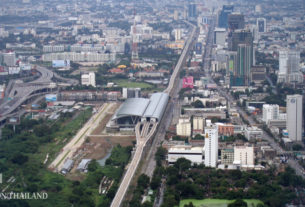DESPITE world oil prices tumbling to 11-years lows, Thai electricity rates are returning to an uptrend, said Viraphol Jirapraditkul, a member of the Energy Regulatory Commission (ERC).
After announcing last month a cut of 1.57 satang per kilowatt-hour on electricity tariffs nationwide from January to April, he said the next four-month period would probably see the tariff go up again.
“According to the initial [assessment], Ft [fuel adjustment electricity tariff] for the second quarter is expected to increase. But we will try to keep it from going up during this year,” he said.
The price of natural gas, which fuels about 70 per cent of power plants in Thailand, is projected to decrease by Bt6 per million British thermal units during the next Ft review period from May to August. However, depreciation of the baht and less electricity generation from hydropower stations due to drought will cause the total cost of electricity production to go up, said the ERC spokesman.
Every Bt1-per-dollar depreciation of the local currency will drive up the electricity tariff by 5-6 satang per kilowatt-hour.
Moreover, Viraphol said more commissioning of solar power plants this year was estimated to drive up the electricity cost by 20 satang/kWh, compared with 17 satang last year.
From mid-2015 to the end of last year, the Ft tariff was cut by a total of 22.62 satang/kWh, sending the average electricity tariffs for all user groups in Thailand to Bt3.7076/kWh, or 0.42 per cent lower.
In comparison, the price of Dubai crude oil had shrunk by 61 per cent, from US$108 a barrel to $41 a barrel during the year. It has continued to decline, to about $31 a barrel yesterday.
Viraphol said the local price of natural gas that fuelled most Thai power plants was only partly pegged to the prices of fuel oil products – 30-40 per cent in the case of domestic natural gas, and 50-60 per cent in the case of natural gas piped in from Myanmar.
Higher import volumes of liquefied natural gas (LNG) have also driven up the cost of Thai electricity.
“In some occasions, it was even cheaper for power plants to run on fuel oil than on gas. We will continue to make sure PTT and Egat [the Electricity Generating Authority of Thailand] use the least costly fuels,” he said.
Energy Minister Anantaporn Kanjanarat said that as gas prices fall, the government could “float” the price of natural gas for vehicles (NGV) to allow it to move up or down along with their actual costs from next month. Currently, the gap between the cost of NGV (Bt14 a litre) and its retail price (Bt13.50 a litre) has narrowed to just Bt0.50 per litre.
Source: http://www.nationmultimedia.com/business/Electricity-may-soon-getting-more-expensive-despit-30276299.html

